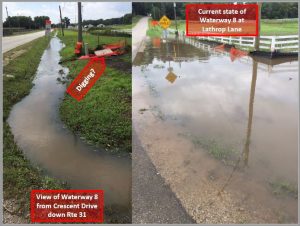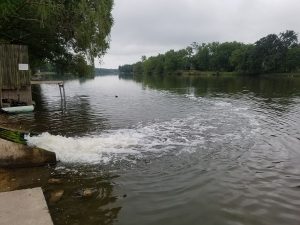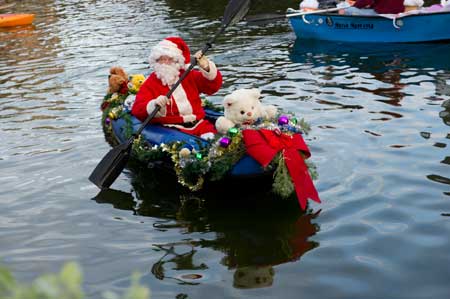By Gary Swick, President
 Many years ago I was given a wood carving from an anonymous source. The accompanying note read: “This is the River Spirit. It only speaks to children and a few select adults. You are one of those.“
Many years ago I was given a wood carving from an anonymous source. The accompanying note read: “This is the River Spirit. It only speaks to children and a few select adults. You are one of those.“
So I was sitting by the Fox River wondering what it has on its wish list for Santa this year. This is what I heard.
The Fox River’s Holiday Gift Requests:
#1 To Flow Free Again. Remove your dams and shoreline walls.
For centuries the Fox River freely ran its course from its birth as a melting glacier to a being a dominant feature in this landscape. Indigenous peoples lived along the banks enjoying fresh water and abundant wildlife. I doubt the river had any wants back then. Humans and the Fox River lived in harmony.
The river may have been proud to provide service to the humans that were drawn to its hydrological power. The dams constructed many decades ago used the river’s force to run mills to grind grain, saw logs for timber, produce electricity, and the upstream impoundments were a source of ice. The river had no choice in its manipulation, but it was highly appreciated by the settlers for its service.
 The dams, spillways, and races that were constructed in the 1800’s to generate power are all now dysfunctional with one exception. The dam in Dayton, the furthest downstream dam, is the only Fox River dam that provides electricity. It also acts as a barrier preventing the upstream invasion of foreign species like the Bighead and Silver (Asian) carp.
The dams, spillways, and races that were constructed in the 1800’s to generate power are all now dysfunctional with one exception. The dam in Dayton, the furthest downstream dam, is the only Fox River dam that provides electricity. It also acts as a barrier preventing the upstream invasion of foreign species like the Bighead and Silver (Asian) carp.
If the Fox River could get just one wish, it probably would ask to be mostly dam-free. That single request would be the most significant contribution to improving water quality, habitat, increased biological diversity, and safety for recreational boaters. It is not an impractical wish. All the dams are artificial structures that require expensive maintenance, making dam removal good environmental and economic sense.
Most of us has seen these dams for our entire lives. Consequently, they somehow seem natural and important to our culture even though they no longer serve any productive purpose. The Fox River most strongly wishes for them to be removed so it can flow freely again and restore its nature as it was .
#2 For the human watershed residents to put the river foremost in their planning and daily actions. Keep storm water pollutants and debris to yourselves.
Half of the water in the river comes from groundwater recharge. It is filtered by soil particles and bacteria, and enters clean. The other half is surface water that  naturally enters through the many tributaries that drain the Fox River’s watershed. Our manipulation of the landscape has altered the surfaces that previously allowed rain and snow melt to be absorbed into the soil. Pavement and rooftops now collect that water and direct it into drains that are conduits to detention basins or street drains. From there, the storm water and all the added surface pollutants travel without treatment into the streams and the river. The blended clean ground water and polluted surface water make up the river. Water quality is now threatened by the surface runoff far more than any specific discharges. Dilution sometimes is an approach to treating pollution, but it is not a solution.
naturally enters through the many tributaries that drain the Fox River’s watershed. Our manipulation of the landscape has altered the surfaces that previously allowed rain and snow melt to be absorbed into the soil. Pavement and rooftops now collect that water and direct it into drains that are conduits to detention basins or street drains. From there, the storm water and all the added surface pollutants travel without treatment into the streams and the river. The blended clean ground water and polluted surface water make up the river. Water quality is now threatened by the surface runoff far more than any specific discharges. Dilution sometimes is an approach to treating pollution, but it is not a solution.
The added volume (that no longer infiltrates into the soil) can have even greater impacts on the river. Since the 1960s, the peak volume of watershed creeks has tripled. All that impervious surface turns regular rain events into major floods in the small creeks. Banks get eroded; habitat is damaged, and the results are cumulatively felt in the main stem of the Fox River.
Don’t blame the river for flooding. Seek to keep water in place where it lands. It is not the river’s job to take the runoff from the whole watershed. Let us restore the system and let the soil receive the rain and keep it in place. Lighten the load on the river habitat.
Unsustainable Sucking and Dumping
Finally, there is the impact from municipal water mining. Every municipality pumps their water from the ground. It is a limited resource, and although we live in an abundant region for now, our rates of withdrawal are not sustainable.
Even Elgin and Aurora, who use the river as a source for drinking water, also blend groundwater for our home use. Every day we pump water from underground and deliver it to homes and businesses. From there, it travels through the local wastewater treatment plant before being discharged into the Fox River itself. In some cases like the Village of Gilberts, it is discharged to a small tributary like Tyler Creek.
deliver it to homes and businesses. From there, it travels through the local wastewater treatment plant before being discharged into the Fox River itself. In some cases like the Village of Gilberts, it is discharged to a small tributary like Tyler Creek.
This second wish must include an awareness of what residents put down the sink drain because it may potentially become river water. Please keep your pharmaceuticals, nasty toxic stuff, and grease out of the kitchen drain or toilet bowl. Send only organic waste to the sewage treatment plant.
In review, the second gift wish from the river is to keep additional water and its contents to yourself.
#3 Respect.
Have some gratitude. Still today, one billion humans do not have access to safe drinking water. In our world here in the Fox River Valley, we flush our toilets, wash cars, and water lawns with drinking-quality water. Don’t feel guilty, just appreciate it. Enjoy what the river system offers but show some respect. Visit the river to really appreciate its beauty.
Be the River’s Santa!
Not sure how to fulfill the Fox River’s requests?

For this month of giving I encourage you to consider the river’s wishes. Learn about and promote dam removal. Consider how your daily actions at home and beyond impact the river and its feeder streams. And become a member of Friends of the Fox River. Let’s build a watershed of caretakers who respect and love our river. That’s what friends do. Become a member, renew your membership, and/or make gifts of a few memberships or our 2019 calendar to your people as a gesture in the season of holiday giving.
The Fox River gives to us every day; show some gratitude, friendship, and give back.
Author’s Note:
In the month of renewal/January, in this newsletter, I will offer some New Year resolutions to be a better watershed citizen. In the month of Love/February, I will offer some tips on really loving your river.

